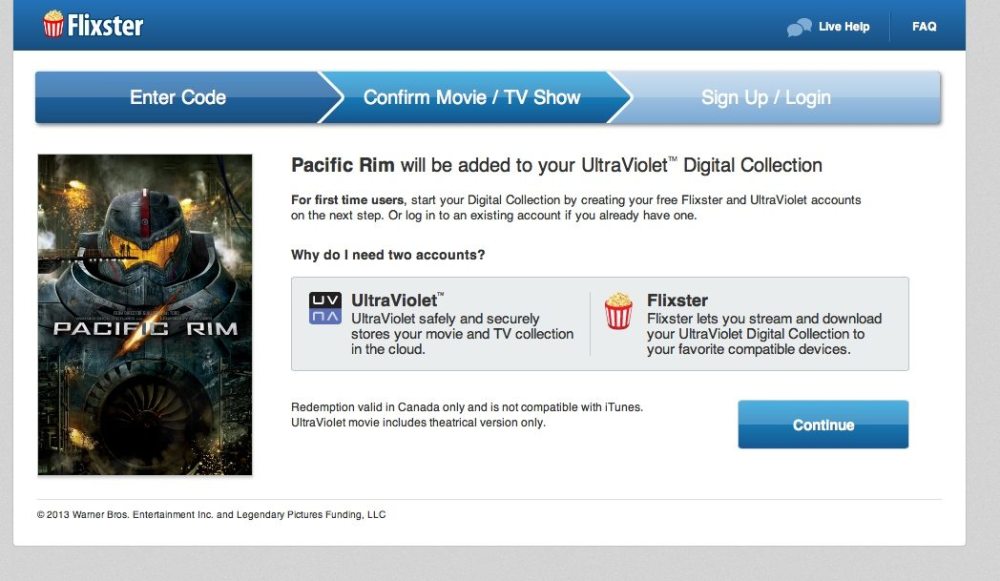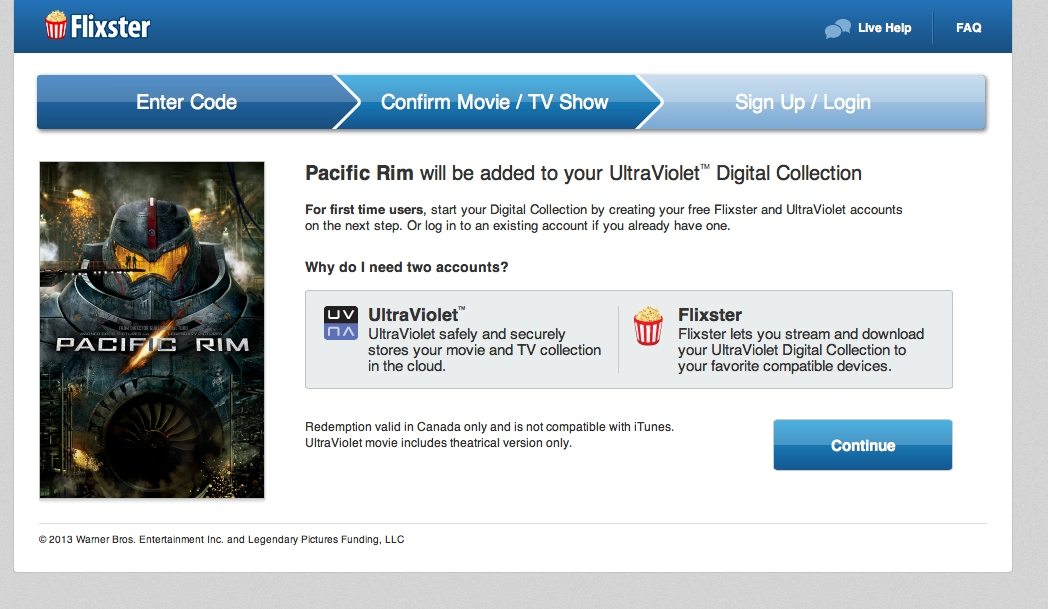
I’m beginning to lose patience with the whole digital movies thing.
Don’t get me wrong, I think the idea of having a digital copy of a movie and being able to watch it on all our devices is great. In fact, I’m fully on board with that. We have Apple TVs throughout the house and an iTunes library large enough that the computer hosting it has a 6 TB external hard drive exclusively for that purpose. And I actually buy those movies. But the studios seem determined to mess up a good thing through competing standards for digital downloads. In particular, the insistence on pushing UltraViolet exclusively seems thickheaded.
When I pick up a movie that’s okay, or one that’s good but doesn’t really showcase special effects, I tend to simply buy it on iTunes. It’s pretty good quality (especially the HD titles), iTunes pricing is comparable to buying a disc off the shelf (plus iTunes cards are constantly on sale which can be leveraged for discounted pricing), having the movie ready on demand instead of driving to a store is useful and Apple has been on a tear lately with early release versions of movies — Monsters University, for example, was available a full month before its retail release date.
When there’s a movie that simply must be in the highest commercially available quality, I buy it on Blu-ray. Actually, I frequently buy the Blu-ray + digital copy option. I don’t mind paying the extra to have the Blu-ray version for my library and a lower quality (but still pretty good) digital version for iTunes to load up the iPads or if one of the kids wants to watch the movie on their computer or an AppleTV-equipped TV. The digital copy is convenient and it helps to save wear and tear on the disc when it comes to casual viewing.
I’ve had some issues in the past. Mostly lost digital download codes. I bought a movie a few years ago that came with an UltraViolet digital download, but an e-mail to customer service yielded an iTunes code instead.
However, I just bought Pacific Rim. It was available as an early release on iTunes weeks ago, but as badly as I wanted to buy it, I held off until it was available on store shelves. Definitely something you want to see in all its high definition glory. This weekend, I picked up the Blu-ray package with digital download. That digital download was UltraViolet, the cloud-based, DRM-laden digital movie standard being pushed by film studios. And while UltraViolet movies can be downloaded and played on Macs and iOS devices (after a Flickster app is installed), the format is incompatible with iTunes and AppleTV.
And now it looks as though UltraViolet is pushing back and no longer exchanging iTunes download codes. I contacted customer support at Flixster (the client for downloading and playing UltraViolet movies), UltraViolet and Warner Brothers (the studio that released Pacific Rim). Besides pointing out the obvious — that the code was an UltraViolet one — the various customer support teams basically went in circles, pointing out the myriad devices that do support UltraViolet and pointing the finger at Apple for not supporting the standard. An example snippet:
“— iTunes does not currently support streaming or downloading of UltraViolet movies and TV shows. If you have any further questions or concerns about an iTunes copy of your movies, please contact the support team at Flixster Customer Care for UltraViolet.”
A quick scan of support forums shows the UltraViolet folks have started cracking down and stopped offering up iTunes codes as a replacement for AppleTV owners.
So if I want Pacific Rim in digital form, I either have to buy it a second time on iTunes, watch the movie on a Flixster/UltraViolet compatible device or illegally rip a copy from the disc I purchased.
Yes, I was fairly warned on the packaging that this was an UltraViolet digital download, not an iTunes version.
That’s not really the point, though. My point is the ridiculous hoops consumers are being made to jump through. If you are a movie studio, why wouldn’t you make that digital download available in a choice of formats? You don’t have to supply multiple codes, just one to a website where the customer picks the format/source of choice and gets one download code. It’s one extra step but, hey, we’re already jumping through a few hoops here and having it end with something we want is worth it. It’s certainly easier than having to register both UltraViolet and Flickster accounts, install the Flickster app on any device I want to watch the movie on and fume about the devices I can’t watch it on.
In reality, I suppose it isn’t UltraViolet itself that I hate (if you like jumping through those hoops, more power to you), it’s the insistence on UltraViolet being the only option.
Honestly, I don’t care how they sort this out in the end, but the standards battle has got to stop. They do this kind of stuff, then wonder why so many people simply bypass buying their products altogether to grab a copy off BitTorrent instead.
It’s almost as bad as competing e-book file formats. As someone who owns Kindle, Kobo, Nook and Sony e-readers (along with the iPad and iBooks combo), don’t even get me started on that one…
Note: I am fully aware that the specifics of this scenario leave me wide open to the “duh, don’t use iTunes or AppleTV” solution. Thanks, but it works well for our purposes (present example excluded), we’re heavily invested in it now and, circling back to point one, it works.



This is a very strange complaint, you’re basically arguing Ulraviolet shouldn’t exist using the very reason Ultraviolet exists as justification. The argument you should be making is Apple needs to get there act together and support Ultraviolet on the iTunes store.
Ultraviolet was created for consumers to allow us a single unified purchase point. Ultraviolet is not a store its a standard. The problem is select vendors have refused to adopt the standard because, simply put, it means less money for them. Apple wants you to purchase everything you already bought elsewhere again on iTunes, Google wants the same thing on Google Play, and the same is true for Amazon. If Ultraviolet was properly implemented it wouldn’t matter if you bought it on amazon, itunes, or google you could watch it on any of them. If the big three digital vendors weren’t so greedy it wouldn’t matter whether you prefer itunes, vudu, google, whatever everything would still be ultraviolet because its a standard not a store.
So you see iTunes is the problem, your Ultraviolet code should work on iTunes, but Apple has chosen to ignore Ultraviolet. There is no way your iTunes purchase will ever be recognized on Google, Amazon, or any other platform because there’s no common standard among them, the only way that could happen is with Ultraviolet or something else in its place.